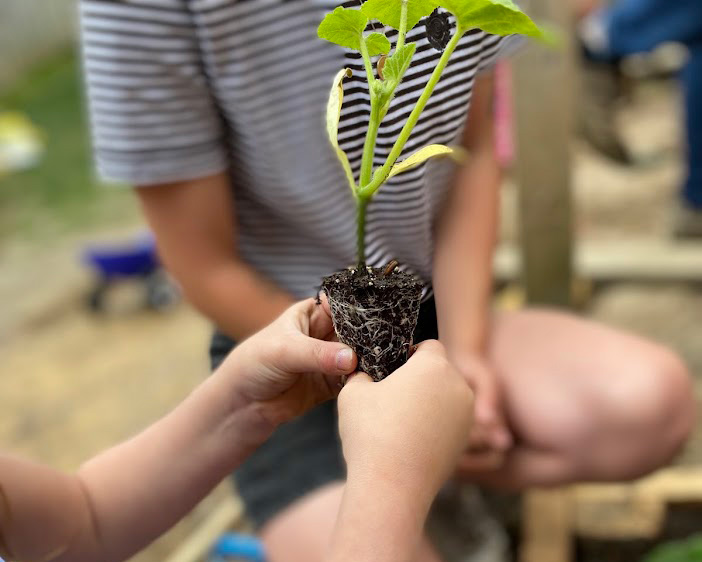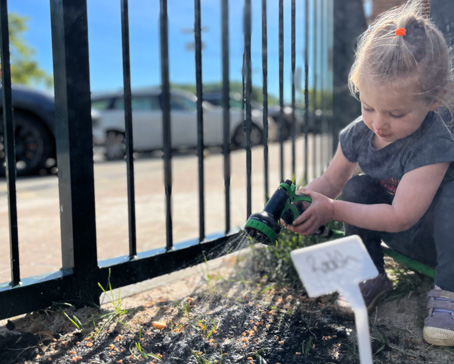Reggio Emilia Influence
Lucy Brock is foundationally inspired by the Reggio Emilia Approach, an educational philosophy based on democratic practice and the image of the child. A child is an individual with capabilities and competencies, who has worth and the right to use their voice democratically, one who learns through a hundred languages, and thrives by creating connections and building relationships with others — both human and object.
Lucy Brock is not a center for custodial care, but a space of best practice and inquiry, where research informs decisions in all essences. We are an extension of home, where intentionality, relationships, observation, investigation, and community are at our core. Children and educators co-construct learning, searching the world for answers together and fundamentally inspiring life-long critical thinkers. Children’s opinions and ideas are valued, their voices are heard, their perspectives are important, and their feelings, no matter how large or small, are safe. Building the foundation of emotional intelligence and sense of self, it is important to us that children are empowered to be themselves and grow in their many unique languages of learning.

Documentation
Lucy Brock utilizes written notes, audio/videotape, and still photography to record the life that happens in the classroom so that adults can revisit experiences with children to plan more carefully future objectives and activities. The process of documentation helps the adults (families, students, teachers, faculty) to be reflective about the children and what is revealed in these artifacts. Educators make learning visible through pedagogical documentation, showcasing the value of children’s ideas and discoveries. This platform of documentation not only provides an opportunity for us to take children’s perspectives but also supports App State students in creating connections between their course content and real contextual experiences.
These artifacts of learning are collected and compiled into an individual portfolio. Through a child’s journey at Lucy Brock, their portfolio becomes a narrative of learning, displaying the winding path of development and discovery.

Emergent or Negotiated Curriculum
At Lucy Brock, children are active participants in learning. Teachers observe and listen closely during times of engagement, developing hypotheses about the big ideas that lie beneath the surface of children’s play. In reflection of these observations, teachers work collaboratively to discuss what they have observed and develop projections for opportunities to deepen children’s connections. Teachers curate a curriculum that embeds learning goals into child-initiated research — a cycle of observation, implementation, and reflection through an emergent curriculum- taking the child’s lead in making decisions regarding what they learn, as teachers facilitate learning.

Children as Competent
All children are competent and capable. The goal is to help children realize their potential by supporting the continued development of competence. Guidance strategies utilized at Lucy Brock entail supporting children’s abilities to problem-solve as independently as possible according to their abilities and developmental levels. A fundamental component of the philosophy of Lucy Brock is that children should never be demeaned or discouraged; instead, children should be encouraged to become effective decision-makers. In addition, children should be given the means to represent their developing theories about the world in many different formats. These formats may include but are not limited to, dramatic play, art, writing, storytelling, block play, manipulative play, sand and water play, music, and movement.
Environment as co-teacher
Much thought and reflection goes into planning an environment that is safe, beautiful, comfortable, and invites children to think, explore, investigate, and create. Teachers provoke wonder through intentionally designing and carefully crafting environments, both indoors and outdoors, inspiring children to embody discovery. At Lucy Brock, community drives practice and democracy influences decisions, both between children, with children, and among educators. Teachers facilitate connections between home and school, uniquely representing children’s individual cultures in the learning environment. Each classroom contains traces of the lives that are lived there — warm, tender spaces of comfort that provoke children to think, explore, investigate, express, and create. Materials are available that are open-ended, with a world of possibilities and a variety of uses. Materials are intentionally selected that do not tell children what to do or how to use them, but support creation and come to life with the uniqueness of each child’s imagination.


Consistency and Continuity of Care
Continuity and predictability are key ingredients for successful development of young children. Lucy Brock strives to maintain consistency and continuity in care for young children. To accomplish this, multi-age grouping is utilized so that children remain with the same caregiver for multiple years.

Appropriate Risk
We believe that children are deserving of opportunities — opportunities to challenge their bodies and their brains; to make a plan, follow through, and reevaluate the outcome; to experiment scientifically with their own capabilities and engage in appropriate risk. We believe in climbing up the slide, carrying heavy stumps, and spilling our milk every once in a while, recognizing that the benefits of authentic, appropriate risk outweigh the convenience of conventional boundaries.
Nutrition
At Lucy Brock, we cultivate community while we nourish our bodies. Meals are less of a routine and more of a social learning experience, from dissecting fresh ingredients grown in our gardens to reflecting on the pizza we created collaboratively. Utilizing seasonal ingredients, our on-site cook and University nutrition students cater unique recipes to nourish each child- the whole child- body, brain, and heart.
Read more about our partnership with App State’s Beaver College of Health Science, where we are creating a local food network: Chancellor’s Grant Funds Partnership To Create Local Food Network With County’s Early Childhood Learning Centers.
